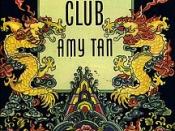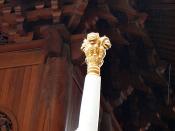At some point in the novel, each of the major characters expresses anxiety over her inability to reconcile her Chinese heritage with her American surroundings. Indeed, this reconciliation is the very aim of Jing-mei's journey to China. While the daughters in the novel are genetically Chinese (except for Lena, who is half Chinese) and have been raised in mostly Chinese households, they also identify with and feel at home in modern American culture. Waverly, Rose, and Lena all have white boyfriends or husbands, and they regard many of their mothers' customs and tastes as old-fashioned or even ridiculous. Most of them have spent their childhoods trying to escape their Chinese identities: Lena would walk around the house with her eyes opened as far as possible so as to make them look European. Jing-mei denied during adolescence that she had any internal Chinese aspects, insisting that her Chinese identity was limited only to her external features.
Lindo meditates that Waverly would have clapped her hands for joy during her teen years if her mother had told her that she did not look Chinese.
As they mature, the daughters begin to sense that their identities are incomplete and become interested in their Chinese heritage. Waverly speaks wishfully about blending in too well in China and becomes angry when Lindo notes that she will be recognized instantly as a tourist. One of Jing-mei's greatest fears about her trip to China is not that others will recognize her as American, but that she herself will fail to recognize any Chinese elements within herself.
Jing-mei's experience in China at the end of the book certainly seems to support the possibility of a richly mixed identity rather than an identity of warring opposites. She comes to see that China itself contains American aspects, just as the...


